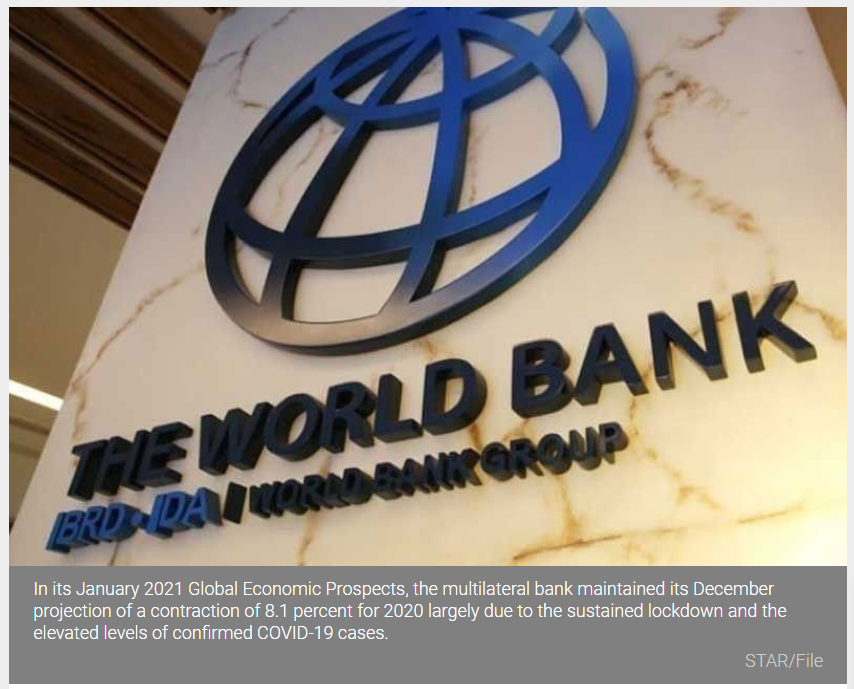World Bank retains 8.1% GDP decline forecast for Philippines
MANILA, Philippines — The World Bank has retained its 8.1 percent economic decline projection for the Philippines in 2020, putting the country among the worst performers in the East Asia and Pacific region owing to the prolonged lockdown.
In its January 2021 Global Economic Prospects, the multilateral bank maintained its December projection of a contraction of 8.1 percent for 2020 largely due to the sustained lockdown and the elevated levels of confirmed COVID-19 cases.
In December, the World Bank severely downgraded its 2020 economic performance projection for the country from a 6.9 percent decline in October, considering also the still steep contraction in the third quarter, as well as the extensive losses incurred from the string of typhoons that battered the country in the last quarter of the year.
“Economies that suffered the worst declines were those with extended periods of lockdown combined with large domestic outbreaks (the Philippines) or domestic policy uncertainty (Malaysia, Thailand, Timor-Leste), and those with a heavy reliance on tourism and travel (Fiji, Thailand, Palau, Vanuatu),” the report said.
“Although the spread of the pandemic appears to have slowed in much of East Asia and Pacific, new infections remain high in Indonesia and the Philippines and have increased recently in Malaysia and Myanmar,” it said.
Coming from a low base last year, the Philippine economy can be expected to grow by 5.9 percent this year and six percent in 2022.
The country is expected to remain under a prolonged quarantine for the rest of the year while awaiting the rollout of vaccines against COVID-19.
For the entire month of January, the country’s growth engine, the National Capital Region (NCR), will remain under general community quarantine as a preemptive measure to curb viral transmission as the holiday season winds down.
The World Bank’s projection was close to the revised government assumption of an economic contraction of between 8.5 to 9.5 percent in 2020, which considered the prolonged imposition of community quarantines nationwide that weakened economic activity.
What was not considered, though, was the occurrence of a new COVID-19 variant that is more contagious.
Acting Socioeconomic Planning Secretary Karl Chua said the economic team would keep a close watch on the impact of the new strain and would make the necessary changes to the outlook for this year as needed.
The inter-agency Development Budget Coordination Committee (DBCC) expects gross domestic product (GDP) growth to bounce back to 6.5 to 7.5 percent this year and eight to 10 percent in 2022 coming from a low base this year.
To curb the spread of the new COVID-19 variant in the country, travelers from 20 countries where its presence had been detected had been banned from entering.
On a global scale, the World Bank said while the global economy is expected to expand by four percent this year coming from a 4.3 percent contraction this year, recovery will be subdued.
Policymakers are thus encouraged to “move decisively to tame the pandemic” and “implement investment-enhancing reforms.”
To support economic recovery, authorities also need to facilitate a re-investment cycle aimed at sustainable growth that is less dependent on government debt, the World Bank said.
Source: https://www.philstar.com/business/2021/01/07/2068650/world-bank-retains-81-gdp-decline-forecast-philippines


 Thailand
Thailand




